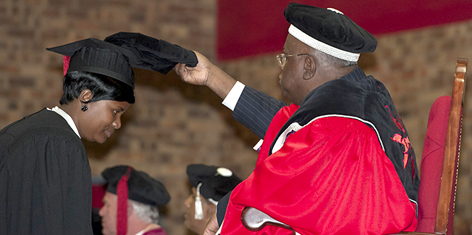Latest News Archive
Please select Category, Year, and then Month to display items
14 June 2024
|
Story Anthony Mthembu
|
Photo Suplied
 Jeremiah Hlahla, a UFS student completing his PhD in Botany at the University of Debrecen as part of an exchange initiative funded by the Erasmus+ Mobility Programme.
Jeremiah Hlahla, a UFS student completing his PhD in Botany at the University of Debrecen as part of an exchange initiative funded by the Erasmus+ Mobility Programme.
As part of an exchange initiative facilitated by the Erasmus+ Mobility Programme, Jeremiah Hlahla, a student at the University of the Free State (UFS), is nearing the completion of his PhD studies at the University of Debrecen in Hungary. Hlahla’s journey, which began in February 2024 and is set to conclude in July 2024, has been a remarkable learning opportunity. “As a first time-traveller to Europe, I have thoroughly enjoyed engaging with people from different countries and cultures,” he said.
The benefits of international collaboration
Hlahla is currently pursuing a PhD in Botany, focusing on plant stress physiology. “My current PhD project investigates the physiological, biochemical and morphological responses of vegetable-type soybean, or edamame, to combined drought and heat stress,’’ he explained. He considers the University of Debrecen the ideal institution to complete his research due to its extensive expertise and resources in similar projects. He noted that his colleagues at Debrecen conduct significant work on plant protection against biotic and abiotic stresses, including salt and drought stress, as well as proteins and amino acids in barley and other legumes.
Given the vast knowledge available on similar projects, Hlahla has found substantial engagement with his work at the University of Debrecen. “Upon arrival, I delivered an introductory lecture presenting my UFS project on the synergistic effects of combined drought and heat stress on the physiology and biochemistry of edamame. It was an engaging session as everyone could relate to my work and asked many questions,’’ he said.
Insights gained from the exchange
Hlahla has also gained valuable lessons that will assist him in his research career, including biotechnology and physiology tools. “I learned how to prepare samples and use high-performance liquid chromatography (HPLC) and reversed-phase ultra-high-performance liquid chromatography (UHPLC) to quantify proteins and amino acids,’’ he said. These techniques are beneficial not only for his current work but will also support future soybean research.
As his experience at the University of Debrecen nears its end, Hlahla reflects on the collaborations and friendships he has formed, which stand out as a significant highlight.
Qwaqwa Campus honours academic excellence
2014-05-21
 Photo: Sonia Small (Kaleidoscope Studios)
Photo: Sonia Small (Kaleidoscope Studios)
Photo Gallery
Our Qwaqwa Campus was this past weekend a hive of activity when graduates, their parents and well-wishers descended on the campus to honour outstanding academic excellence during the Winter Graduation ceremonies.
On Friday graduates from the Faculty of Humanities, as well as the Faculty of Economic and Management Sciences, were addressed by Tommy Makhatho, Managing Director of the Qwaqwa-based Bibi Cash and Carry.
Makhatho urged graduates to continue working hard way beyond their graduation day and to dream big.
“Dream big and don’t let your poor background hold you back,” Makhatho said.
“Don’t let people say you can’t or that you will fail. Take up one idea. Make that one idea your life, think of it, dream of it, live on that idea, let your brain, muscle, nerves and every part of your body be full of that idea and leave every other idea alone. This is the way to success. If you don’t build your dream, someone else will hire you to help them build theirs,” said Makhatho, the winner of the 2013 Sanlam/Business Partners Entrepreneur of the Year and Job Creator of the Year awards.
On Saturday, graduates were treated to yet another moving message by eNCA’s news anchor, Mabale Moloi, herself a graduate in Biological sciences.
“If there is one ability that we should all practice on a daily basis, it is work ethics. This is a value based on hard work and diligence,” Moloi said.
Moloi further shared her views on what makes excellent work ethics.
“There are five very important factors of work ethics that we all need to be aware of. One of them is reliability. This means how committed you are to completing a task that is given to you within a particular period of time,” said Moloi.
“The second one is dedication. This means how prepared you are to go the extra mile in completing a job or your studies. Thirdly, one’s level of productivity is very important in having an excellent work ethic. This refers to giving the best of yourself, even to the extent of surpassing what is expected of you.”
“Fourthly, there is co-operation. We all must understand the value of team work and how it leads to success. And this, when paired with character, self-discipline and strong personality, will distinguish you from anyone else,” Moloi added.
Among the more than 800 degrees, diplomas and certificates conferred, were three PhDs in Physics, Polymer Science and Zoology, respectively. Four Masters of Science degrees were conferred cum laude.